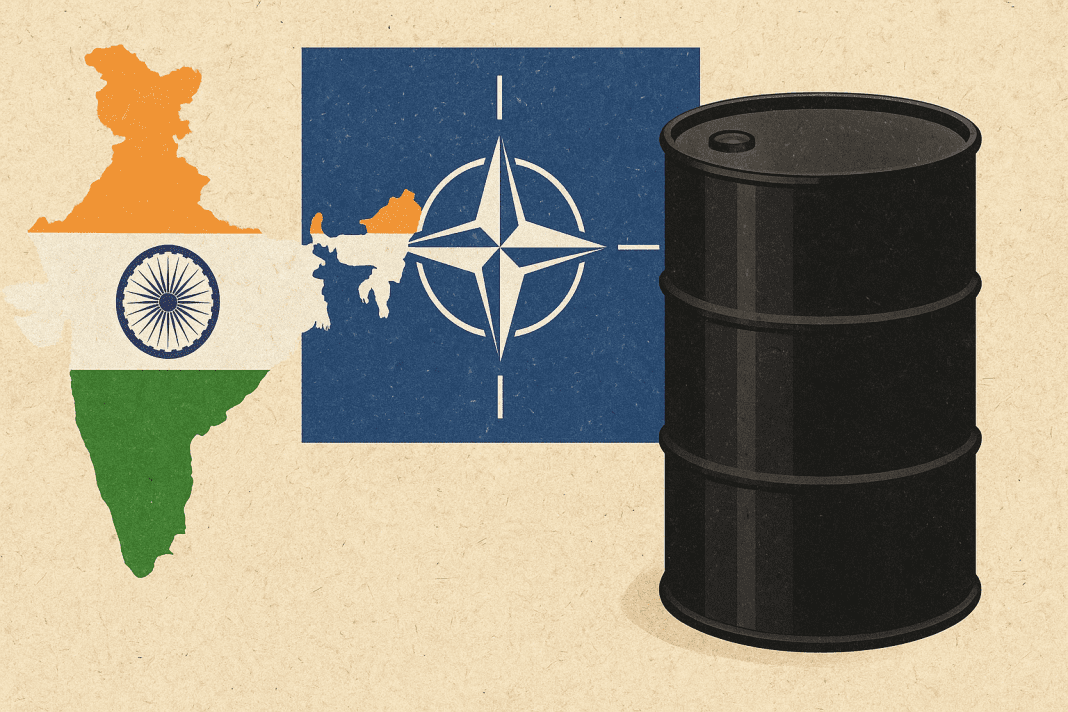India has firmly dismissed a recent statement made by NATO Secretary General Mark Rutte. Rutte had claimed that Indian Prime Minister Narendra Modi asked Russian President Vladimir Putin to explain Russia’s strategy on Ukraine after the United States imposed a penalty on India for buying Russian oil.
India Refutes NATO Chief’s Remark
On Friday, India’s Ministry of External Affairs (MEA) responded sharply. It described the claim as “factually incorrect and entirely baseless.” The ministry spokesperson, Randhir Jaiswal, clarified at a press briefing that no such conversation ever took place between Prime Minister Modi and President Putin.
“At no point has Prime Minister Modi spoken with President Putin in the manner suggested. No such conversation has taken place,” Jaiswal told reporters.
India made it clear that the claim does not reflect reality and is misleading. The Indian government has emphasized that such statements, especially when made by the head of a major international security alliance, can create confusion and misrepresentation.
India Calls for Responsible Statements from NATO
India also expressed its disappointment at the fact that the remark came from NATO, which is considered one of the most influential and respected global organizations. NATO is an alliance of more than 30 countries, mainly from Europe and North America, and plays a key role in global security discussions. Because of this stature, India believes that its leadership should act with care and responsibility.
“We expect the leadership of an important and esteemed institution like NATO to exercise greater responsibility and accuracy in public statements,” Jaiswal said.
By calling the NATO chief’s claim “baseless,” India highlighted the need for responsible communication in international diplomacy. New Delhi believes that incorrect remarks about its leaders can affect its global image and create unnecessary tension.
India’s official response also reaffirms its consistent approach to the conflict between Russia and Ukraine. Since the war began, India has maintained a balanced position, avoiding direct criticism of Russia while continuing to call for peace, dialogue, and diplomacy. At the same time, India has prioritized its own energy and economic needs, saying that its decisions are based on what is best for its people.
Defends Oil Imports and Responds to US Tariffs
Apart from NATO’s comments, India is also managing trade tensions with the United States. Recently, Washington imposed a 50 percent tariff on Indian goods. This tariff includes two parts: 25 percent linked to India’s already high tariffs on foreign imports, and another 25 percent as a penalty for India’s purchase of Russian oil despite Western sanctions.
India, however, has strongly criticized these actions. The government called the tariffs “unjustified” and “unreasonable.” The government has also defended its oil import policy, stating that it guides energy choices based on national interest and economic security.
During the briefing, Jaiswal reiterated, “We make our energy import decisions keeping national interests and economic security in mind.”
India relies heavily on oil imports, as the country ranks among the largest energy consumers in the world. Buying oil from Russia has allowed India to secure affordable supplies at a time when global energy prices remain unstable. Officials have repeatedly emphasized that they make these decisions independently, ensuring that they meet the needs of India’s population.
NATO Betrayed? Hungary Pumps Billions Into Moscow’s War Chest With 86% Russian Oil Dependence
The imposition of high tariffs by the US has added friction to bilateral trade ties. India has objected to linking its independent energy policies with penalties imposed by another country. The dispute highlights the complex challenges India faces as it balances its economic requirements with growing international pressure related to the Russia-Ukraine conflict.
By rejecting the NATO chief’s remarks and by defending its trade and energy policies, India has reinforced its stand that external claims and penalties will not dictate its choices. The government has insisted that its policies remain focused on its national priorities and the well-being of its people.
